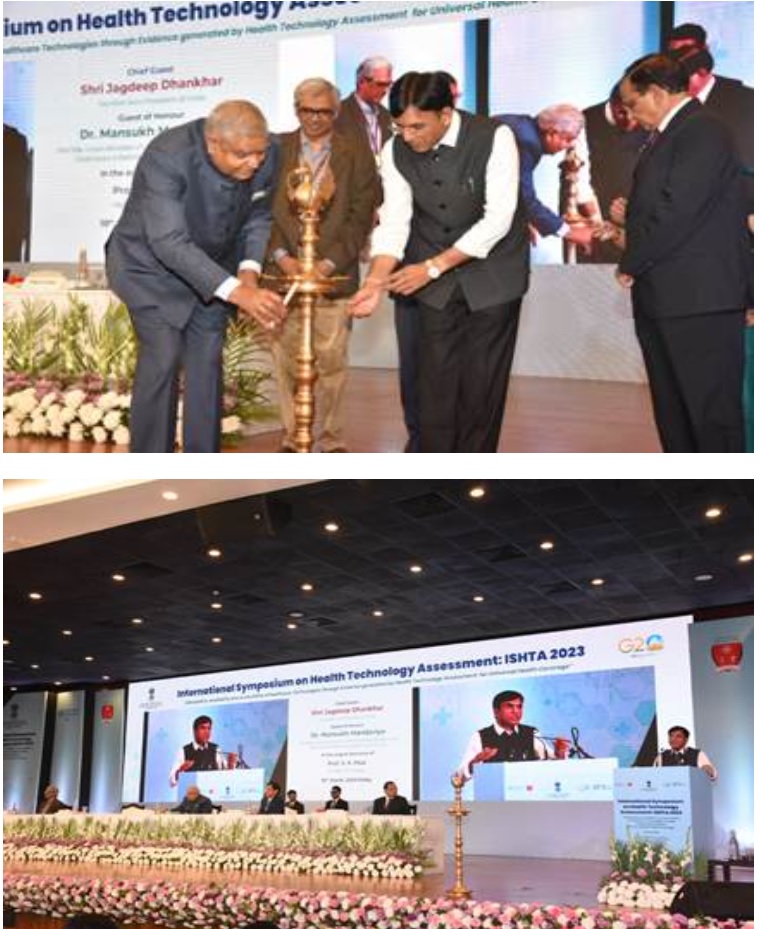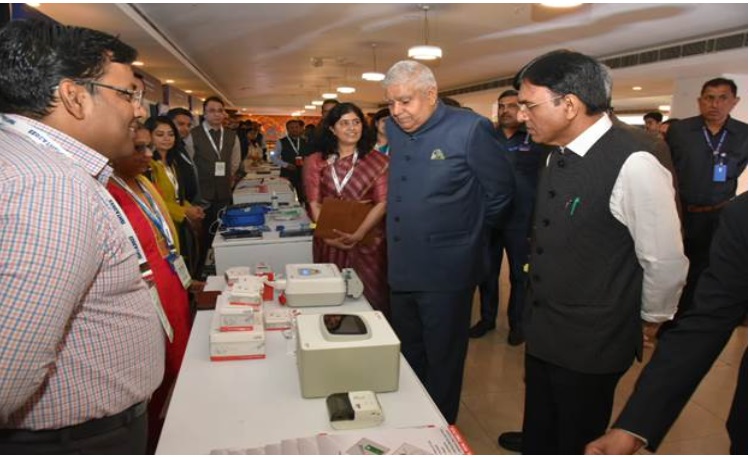“India is a global example where we have used technology for making available efficient services to the people. Technology enables accessibility and reduces out of pocket expenditure for citizens” This was stated by Shri Jagdeep Dhankhar, Hon’ble Vice President of India at the second International Symposium on Health Technology Assessment (ISHTA) 2023 in the presence of Dr. Mansukh Mandaviya, Union Minister of Health and Family Welfare, here today. Dr. V K Paul, Member (Health), NITI Aayog was also present at the ceremony.
The international symposium was organised by Department of Health Research, Ministry of Health and Family Welfare in collaboration with World Health Organisation (WHO) and Centre for Global Development. The symposium with the theme “Affordability, Availability and Accessibility of Healthcare Technologies through Evidence generated by Health Technologies Assessments (HTA) for Universal Health Coverage” has provided a platform for stakeholders such as academia, researchers, policy makers, industry, etc., to share their views on importance of HTA, international perspective on health technology use and host first ever HTA marketplace in the country, providing knowledge/product sharing platform. The symposium was attended by about 250 participants.


Reiterating the clarion call made by Hon’ble Prime Minister about services reaching the last mile and remotest part of the country following the philosophy of Antyodaya, Shri Jagdeep Dhankhar said that “India is moving towards ensuring affordability, accessibility and equity through revolutionary steps like Aatmanirbharta initiative, behavioral changes through Swacchh Bharat Abhiyan, affordable medicines through more than 9,100 Jan Aushadhi Kendras, strengthening medical workforce, institutions etc. The government has also taken several initiatives to ease the burden on the poor and downtrodden section. With the world largest, transparent and accountable program of Ayushman Bharat being launched by this government, it is catering to the citizens welfare and simultaneously generating jobs and enterprise”. Speaking about significance of health technologies and its assessment processes, Shri Dhankhar threw light on the crucial nature of technology in ensuring equity. He said that “technology is a turning point in ensuring quality governance. The availability of healthcare services especially in the recently opened Ayushman Bharat Health and Wellness Centres (AB-HWCs) is a gamechanger for a common citizens.”
He said that India has shown its mettle by successfully handling the COVID pandemic and supported countries through medicines and expertise. The strategy of Health Technology assessment is yet another step towards an innovative approach to strengthen the ecosystem that is working towards universal health coverage. Thus, he urged stakeholders to see India as the land of opportunity and owing to India’s philosophy of Vasudaiva Kutumbakam, they can be rest assured of being part of a global family where we consider health and wellness for all.
Thanking stakeholders present in today’s brainstorming sessions, Dr. Mansukh Mandaviya said that “assessments of public interventions taken for public welfare is the need of the hour.” This will allow establishing efficient processes and work as a feedback mechanism for better cost-effectiveness of programs and initiatives. He further said that “ISHTA 2023 will go a long way in helping to facilitate multi-country cooperation through new collaborative projects in the health sector. The Health Technology Assessment will help in further strengthening the healthcare ecosystem and achieving Sustainable Development Goals”. He said that Government of India is committed to extending healthcare services to all its citizens as part of India’s Universal Health Coverage (UHC) agenda. The resources can be optimally utilised with the help of Health Technology Assessment (HTA), which is a widely used methodology globally, for optimization of resource allocation and utilization in health.
Reflecting upon India’s age-old ethos and civilizational essence of considering Health as a service, Dr. Mansukh Mandaviya said that “Health is considered a service in our country and engaging in health sector, gives one the opportunity to serve the humanity as against considering it for commercial exploitation.” Giving the example of Co-WIN which was turned into a universal public good, Dr. Mandaviya said that “India has always been responsible to global community and any research and innovation happening in the country is readily available for the world to use so that it benefits all. This is an apt example of our dedication towards one world one family approach in this amrit kal”. “It is our responsibility and duty to not only provide affordable and quality healthcare to the country, but to use our strengths to serve and support global healthcare goals under the philosophy of Vasudhaiva kutumbakam. Under the visionary leadership of Prime Minister, our aim remains to become developed country not through competition but through coordination, collaboration or Sahyog. Similar collaboration among stakeholders is required in health sector”, he further added.
Heralding the session on Health Technology Assessment, Dr. Vinod Kumar Paul said that country has taken huge leap in terms of steps for the betterment of countrymen. Responding to the needs of local stakeholders and creating strong health systems at local level will be a boon in coming future. He said that “our responsibility remains to work with the available resources and come up with efficient and highest possible outcomes. For this Health Technology assessment will be crucial.” Quoting Mahatma Gandhi, Dr. Paul said that equity remains at the heart of India’s endeavor for development and the government prioritizes the vulnerable section along with economic progress. He emphasized on using the best practices from telemedicine arena, focusing on supply side constraints too, along with identifying affordable interventions across one health interventions. He thus, urged stakeholders from wide ranging areas to strengthen this collaboration with world health community and respond to the changing needs of the country.
HTA provides systematic evaluation of properties, effects and/or impacts of health technologies or interventions. HTA facilitates realization of greatest amount of health gain for every rupee spent. Therefore, HTA is a multidisciplinary process that assesses health technologies i.e., drugs, devices, healthcare programmes etc. for their safety, efficacy, cost-effectiveness and equity issues. HTA stakeholders are Academia, Researchers, Policy Makers, Industry, etc. to share their views on importance of HTA for accessibility, availability and affordability of health technologies as a step towards Universal Health Coverage.
The symposium also hosted a Market Place that showcased the prominent HTA recommendations that has been implemented by the State and the Central Government. Some of the Health technologies that were displayed –ABR Hearing Screening device for neonates, Sickle cell diagnostic kits, Safety Engineered Syringes, Portable ECG, Cy Tb for TB diagnosis, Low cost ventilators and Neonatal Resuscitators etc. The market place with enhance public private partnership. The marketplace showcased the Health Technologies for which HTA has been done by Health Technology Assessment in India (HTAIn). The concept of such a marketplace is first of its kind in the world to showcase the technologies evaluated through HTA. It is a step towards strengthening of the Government of India initiative for “Atmanirbhar Bharat” and “Make in India”. About 20 technologies assessed and evaluated by HTAIn were displaced in the Market Place.
Shri Sunil Kumar Gupta, Secretary to Vice-President of India, Dr Rajiv Bahl, Secretary, Department of Health Research and Director General, Indian Council of Medical Research, MoHFW Dr Roderico Ofrin, World Health Organization Representative to India, Representatives from 23 Countries, Ambassadors from Gambia, Morocco, Lesotho, Burundi and Eritrea. International senior officials from Bhutan, Nepal, Sri Lanka, Indonesia, Thailand, Gambia, Rwanda, Djibouti, Madagascar, Malawi also participated.